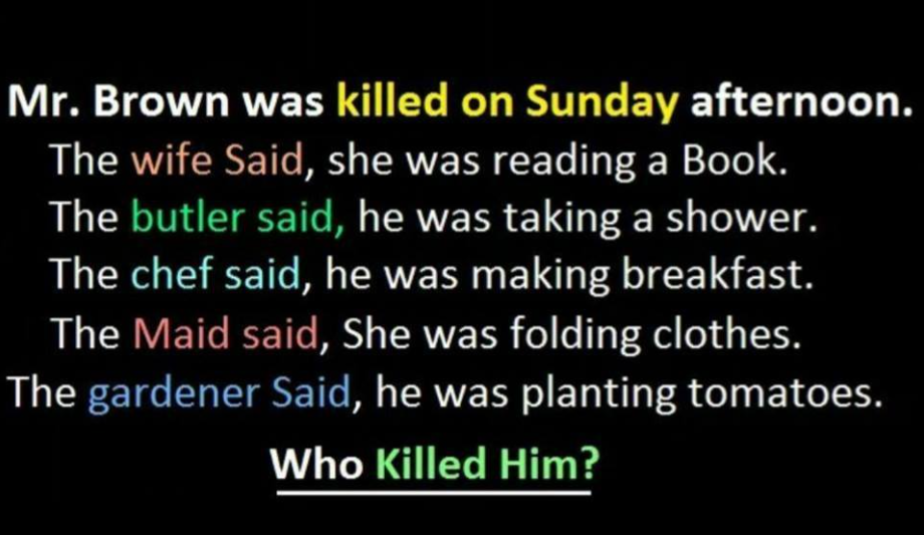Riddles have always been a captivating way to challenge our minds and sharpen our thinking. One particularly intriguing puzzle involves the mysterious murder of Mr. Brown on a Sunday afternoon. Can you figure out who the culprit is based on the alibis provided by the suspects? Let’s break it down step by step and see if you can solve this crime.

Here’s what we know:
- Mr. Brown was killed on a Sunday afternoon.
- The wife said she was reading a book.
- The butler claimed he was taking a shower.
- The chef said he was making breakfast.
- The maid mentioned she was folding clothes.
- The gardener said he was planting tomatoes.
At first glance, all of these alibis might seem plausible, but if you look closely, one of them doesn’t quite add up. Are you ready to uncover the truth?
Analyzing the Alibis: Who’s Telling the Truth?
The key to solving this riddle lies in carefully examining each suspect’s story. Let’s dissect each alibi and see where things start to fall apart.
The Wife: Reading a Book
The wife claims she was reading a book during the time of the murder. This alibi seems fairly normal and doesn’t raise any immediate red flags. Reading is a common afternoon activity, and there’s nothing unusual about it.
The Butler: Taking a Shower
The butler’s alibi is that he was taking a shower. While this might sound irrelevant to the case, it’s also not particularly suspicious. People take showers at various times of the day, and there’s no obvious reason to doubt this statement just yet.
The Chef: Making Breakfast
Here’s where the story starts to unravel. The chef claims he was making breakfast. But think about it—Mr. Brown was killed in the afternoon. Breakfast is typically prepared in the morning, not in the afternoon. Why would the chef still be making breakfast at that time of day? This is the clue that gives everything away.
The Maid: Folding Clothes
The maid says she was folding clothes. This seems like a normal household activity for a Sunday afternoon, and there’s nothing here that would suggest foul play or inconsistency.
The Gardener: Planting Tomatoes
At first glance, planting tomatoes might seem like an odd activity for a Sunday afternoon. However, depending on the weather and the season, it’s not implausible for the gardener to be tending to his plants during that time. So, this alibi also holds up.
Common Mistakes: Focusing on the Wrong Details
Many people make the mistake of jumping to conclusions too quickly when solving this riddle. They often suspect the gardener because planting tomatoes might seem strange on a Sunday afternoon, or they think the butler is suspicious because taking a shower seems irrelevant to the case. But these are distractions.
The real solution comes from focusing on the timeline. The crime took place in the afternoon, and the chef’s alibi about making breakfast simply doesn’t fit. This small detail is what many people overlook.
Why the Chef’s Alibi Doesn’t Add Up
Now let’s break down why the chef’s story is the key to solving this riddle. Breakfast is usually served in the morning, so why would the chef still be making breakfast in the afternoon? The only explanation is that the chef is lying to cover up the real timeline of events. This inconsistency in his story reveals that he must be the one who killed Mr. Brown.
When solving riddles, especially ones involving timelines, it’s important to pay attention to small details like this. The chef’s alibi doesn’t match the time of the murder, and that’s the clue that points directly to him as the culprit.
How to Avoid Getting Tripped Up by Riddles
One of the biggest challenges when solving riddles is not getting distracted by irrelevant details. In this case, readers often focus on suspicious-sounding activities like the gardener planting tomatoes or the butler taking a shower. While these might sound odd, they don’t directly conflict with the timing of the murder.
To solve riddles like this, you need to think critically and ask yourself: Does this alibi make sense in the context of the timeline? Once you start focusing on the timing, the solution becomes much clearer.
The Importance of Paying Attention to Details
Riddles like this one are designed to test your attention to detail and logical thinking. The most common mistake people make is overlooking small inconsistencies in the clues. In this case, the chef’s alibi was the only one that didn’t match the timeline, which made him the obvious suspect once you analyzed the details closely.
If you enjoy puzzles that make you think outside the box, this type of riddle is a great way to practice your problem-solving skills. The more you train your brain to look for subtle clues, the better you’ll get at cracking even the trickiest puzzles.
Conclusion: The Chef is Guilty!
So, who killed Mr. Brown? After analyzing all the alibis and focusing on the timeline, it’s clear that the chef is the murderer. His alibi of making breakfast in the afternoon doesn’t fit with the time of the crime, and that inconsistency is what reveals his guilt.
Did you figure it out? If you got it right, congratulations! If not, don’t worry—riddles like this are meant to be challenging. The key to solving them is paying attention to the details and not getting distracted by irrelevant information.
Now that you’ve cracked this mystery, why not try more riddles to keep your brain sharp? Share this puzzle with your friends and see if they can figure out who killed Mr. Brown!


